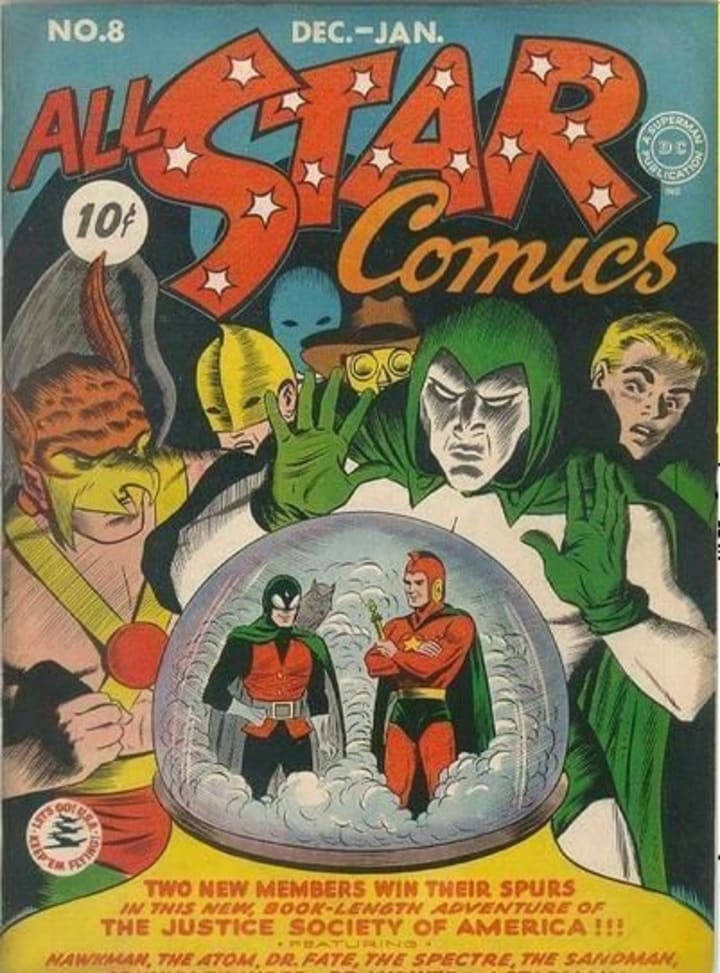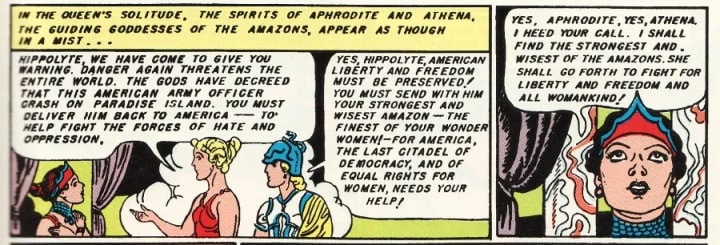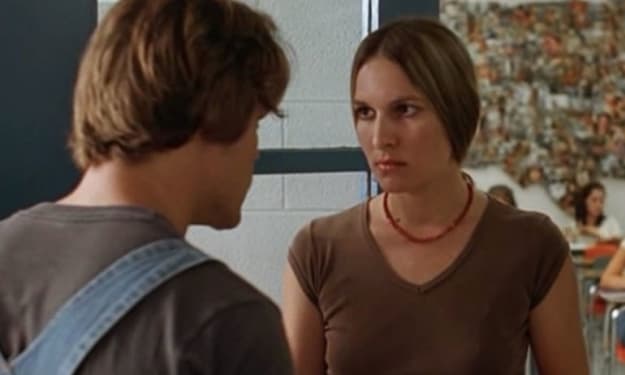
The word propaganda can be something of a loaded term. Most of the time, people view it in a negative connotation. It invokes an inherently biased agenda for political means. Often there are uses of it without the person's realization. I recall a scene from television miniseries Hitler: The Rise of Evil, in which Hitler invites reporter Fritz Gerlich to come write for him and his party.
Gerlich: But I don't write...propaganda.
Hitler: Who said anything about propaganda? I'm talking about the truth!
By no means am I labeling anyone a Nazi! What one needs to take note from this interaction is that most of the time, people view the other side of spewing propaganda. Meanwhile, their faction only delivers the truth. Propaganda is below you and your side.
We also need to understand that the Golden Age of Comics during World War II were all propaganda. Can you become any more political than the cover of Captain America's debut of punching Hitler? Superman says you can 'slap a Jap', believe it or not. What is unique about Wonder Woman's though is her timing and rather subtle nature of the issue. To better understand this question of if Wonder Woman was pro-interventionist propaganda, we must look not only at her debut, but also the history of her creation and the historical context of America pre-Pearl Harbor.
What is Wilsonianism?
Understand, this has nothing to do with Wilson's infamous and horrible racism towards African-Americans. Wilsonianism comes from President Woodrow Wilson's foreign policy during the first World War. Prior, America has a long history of isolationism, with a few exceptions. Americans prided themselves on the fact they never entangle in the affairs of Europe. Many immigrants will come to America to escape the constant drama of continental Europe. The Great War erupts in the Summer of 1914, but the United States will not enter until the Spring of 1917. The reasoning for this late entrance is due to both isolationism and having no real direct threat to the United States at the time.

Wilson is something of an internationalist and comes to the presidency with big ideas to change the country! President Wilson comes to the U.S. Congress asking for a declaration of war, stating, "The world must be made safe for democracy." Wilson is not arguing for or about the rights of Americans. He steps out onto a larger stage, seeing the United States as part of a broad community, rather than as an island. America now will be the protector and enforcer of democracy, for only American democracy can survive if the world embraces liberal forms of government. Wilsonianism supports the spread of democracy, collective security, and the right of self-determination for peoples.
Reevaluating Wonder Woman's Debut
We first need to both dispute and understand the date of Wonder Woman's debut. People see the month on the covers of old comics and understandably assume that is the release date of said comic. All-Star Comics #8 is her debut, with a simple nine-page origin story. At the top of the cover, above the title, it reads December - January. Yet, this is the pull date for newsstands. This dating exists to signal to newsstands when to return or destroy unsold issues.

Wonder Woman's date of birth is October 21, 1941. Prior, I thought Wonder Woman was something of a reactionary propaganda ploy to Pearl Harbor of December 7, 1941. With a misunderstanding of the cover pull-date, this can be an understandable conclusion to draw. However, Wonder Woman's creation does not occur overnight. The father of Wonder Woman is none other than Dr. William Moulton Marston.
Enter Dr. Marston
Some may know him better under his pen name, Charles Moulton. This man is truly something else, he's a lawyer, a psychologist, a professor, and even worked as a consultant for films. Dr. Marston holds several degrees and lived what some called an experimental life, meaning a polyamorous relationship. Polyamory is still not the norm but has more acceptance than before. His lover, Olive Byrne, was the niece of Margaret Sanger, a fierce feminist who advocated for birth control, and goes on to found Planned Parenthood.

Marston was something of a feminist as well, unorthodox, given the times compared to contemporary male feminists. He writes in the Washington Post in late 1937,
"The next 100 years will see the beginning of an American matriarchy—a nation of amazons in the psychological rather than the physical sense. In 500 years there will be a serious sex battle. And in 1000 years women will definitely rule this country."
He defends comics, which even before the comic scare of the fifties are dangerous filth for children...so says the censors. In 1940, Marston notes about the perceived sadism of comics “when a lovely heroine is bound to the stake, comics followers are sure that the rescue will arrive in the nick of time. The reader’s wish is to save the girl, not to see her suffer.”
Why is any of this important, you ask? One, this shows us the mind of the man who creates Wonder Woman. If we want to, we can pigeonhole him into that radical, liberal, academic stereotype. Our creator is hardly a status quo man of the establishment. Before Pearl Harbor, the status quo of America is isolationism.
Understanding Isolationist America
Everyone who is anyone knows of and loves World War II. By this, I mean they support the Allied Forces in extinguishing tyranny and liberating the world. Ask the most a-political person born generations afterward, and they will tell you it was a righteous war to fight. Conservative, liberal, Republican, Democrat, it does not matter. The majority say World War II was a just cause. A consensus like this does not exist for other wars, such as the Vietnam War, for example. Sadly, because of this dynamic, the history leading up to World War II for Americans ends up on the cutting room floor. In truth, we were in no hurry to go to Europe! See the old footage from 1939 below!
We need to understand this was no fringe movement. Senators William Edgar Borah, Arthur H. Vandenberg, Gerald P. Nye, and Robert M. LaFollette Jr., all-powerful men with sway, continually vote for non-interventionism. The U.S. Representative Louis Ludlow fights for his Ludlow Amendment from 1935-1940. His amendment calls for a public referendum before any declaration of war. Of course, this does not include the defense of the country, where no referendum is required. Congress will go on to pass numerous Neutrality Acts beginning in 1935. Yes, these acts expand with each year, but there was still no dire call for war.
The American First Committee comes to being in September 1940. Many famous names are of affiliation with this non-interventionist pressure group. These names include future President Gerald Ford, future Supreme Court justice, Potter Stewart, future Peace Corps director, Sargent Shriver, and Sears CEO Robert E. Wood. Newspaper publishers such as Joseph M. Patterson (New York Daily News) and Robert R. McCormick (Chicago Tribune) donate some funds. John F. Kennedy writes to the AFC, "What you are doing is vital." The American First Committee strongly believes that "American democracy can be preserved only by keeping out of the European war." American intervention can only lead to trouble rather than peace, or glory is the overall idea.
Now, the AFC can be something of a fringe movement. Anti-Semitics, pro-fascists, and communists use the group for their ends. With Charles Lindbergh's perception in history now, this certainly brings down the group's credibility, given he's the group front man.
Gallup is a relatively new company when World War II erupts in Europe. Before World War II, no real public polling exists as we know it today. Gallup is quick to change this and ask Americans in September 1939.
If it looks within the next few months as if England and France might be defeated, should the United States declare war on Germany and send our troops abroad?
Believe it or not, 42% of Americans favor declaring war. Yet, 48% of Americans want no declaration. Lastly, 10% have no opinion. Although certainly not a majority, including the 10% and there is no demand for a declaration of war. After Nazi Germany easily defeats Poland, Gallup returns and asks Americans if they support a declaration of war. By this time, America is showing its true colors, as 71% oppose a declaration of war. In the Spring of 1940, Nazi Germany marches into Western Europe. Gallup asks, Do you think the United States should declare war on Germany and send our army and navy abroad to fight? By this time, 93% of Americans give an outstanding no! Months later, France falls to Germany, and 61% of Americans say to keep out! By the end of the summer, a selective service draft begins, and Gallup is changing its wording. Should America help Europe, "even at the risk of getting into the war?" From here on, Americans favor interventionism. Keep in mind the question from Gallup. They are not asking Americans if they support a declaration of war, but of helping Europe. The American First Committee is still going strong, and the U.S. Congress has no interest in declaring war. Lastly, no Americans are marching down the streets with signs reading War Now and protesting their officials for a declaration.
We finally return to Wonder Woman. One must understand the story of Diana is not born overnight. Marston turns in his first draft in early 1941, again before we declare war. Everything going on during his scripting can have a possible influence on him. The tide is turning in favor of war now for Americans. Franklin Delano Roosevelt only gets a third term because of the war. However, President Roosevelt learns a lesson from the administration of Woodrow Wilson - Americans cannot be lead to war. Instead, they must decide upon it for themselves. Marston may be taking a similar approach through Wonder Woman.
Challenging Amazonian Isolationism
The Amazons and Paradise Island are no stranger to isolationism. Queen Hippolyta tells their tale of war and slavery under Hercules in Ancient Greece. After their liberation, finding Paradise Island and settling into isolationism for over a millennium. She continues to make her case well, arguing, "here is no want, no illness, no hatred, no wars..." and that this is a promise made to the Goddess Aphrodite if they want to remain "safe and in peace." Wonder Woman's mother makes a solid argument. Why go looking for trouble when we have it so good? Americans feel the same way.
Hippolyta is hardly concerned with returning Captain Steve Trevor after he crashes on their island. However, Diana proclaims, "he must be taken back to America to finish the job he started!' What sways Hippolyta is the lecture from the Goddesses Aphrodite and Athena. What is interesting is that Aphrodite orders that this man returned to his home and aid with the war. Both goddesses make note that this war has nothing to do with the rights of Amazons. Aphrodite proclaims this is a war against the "forces of hate and oppression." Athena speaks of preserving "American liberty and freedom," while noting America as the "last citadel of democracy, and of equal rights for women." Now we can debate the accuracy of her statement in regards to American democracy and its status of equal rights for women both then and today. That alone is a separate discourse.
President Wilson himself is a very religious man. Rumor has it Wilson believed that God ordained him to be president and he called the war a godsend. Wilson was the son of Presbyterian minister, and elements of this carry with him into his adult life. He has this notion that the United States is God's country and has been chosen by God to lead this divine mission to, in a sense, Christianize the world. Do not take this as spreading the faith but the principles and values of Christianity. I bring this up because Aphrodite tells Hippolyta that the Gods decreed that Captain Trevor crash on Paradise Island. Hence, it was the work of a higher force that leads to intervening in this conflict. Much like Wilson's train of thought, this war is a godsend.

Finally, Hippolyta heeds the call to fight for "liberty and freedom and all womankind." Again, much like Wilson's internationalism, the Queen speaks nothing about the rights and freedoms of her people. Instead, this is a divine mission to protect all peoples!
Wonder Woman herself is looking to intervene as soon as possible. Little detail shows why this is, save for what we can infer. One, being she is still young, naïve, and ignorant of the history of men. Second, she is Marston's mouthpiece in a sense. On average, it is easier for generations prior privy to war to rebuttal any possible new conflict. It is through Diana's young naivete and the words of the goddesses, which show the inward selfishness of isolationism. If anything, this is how you sell the American people on a war. Sure, there is no current, direct threat to you. However, the idea that said conflict expand and later endanger you and all that you love. Mix this with the Christian culture of America, with the notion that we should heed the word of God or Gods if you are an Amazon. Then, how can one deny intervening?
What's truly fascinating is how the comic tries to sell the idea that Amazons must fight on behalf of America! When we have many Americans not wanting to fight for anyone! Marston is making a call for collective security here, showing America's elitism and how we are all our brother's keeper in this world. If Americans read this or hear of another example, is it possible the minds of Americans will change? One cannot gauge this, given we have no incident to determine such a hypothesis.
Wilsonianism Today
According to historian H.W. Brands, we are all Wilsonians now. There may be some fact to this with conflicts such as the Korean War, The Vietnam War, The Gulf War, The Iraq War, and the War on Terror. All of these wars result from non-direct threats. Politicians cloak their speeches in that Wilsonian language of collective security and world peace. Yes, all of these wars are relatively not popular but do not start that way. Hence, perhaps Brands means all of our politicians and advisors are Wilsonian. Support for Afghanistan has significantly dropped. President Obama was unable to sell the American people on Syria. The people were in no hurry to go to war with Iran after President Trump's attack. However, Brands made this point in 2016 and even notes he's not sure if that will remain the status quo in four years.
Four years later, and here we are, yet Wonder Woman is still quite the interventionist. Not only in comics but in other media. In the Justice League animated series opener, Secret Origins, Wonder Woman, and her mother experience "bad omens." Diana fears humanity is in their darkest hour! Yet, Hippolyta shrugs this off as none of her concern, citing the gods will protect them on Themiscyra from any threat. Instead, Diana dons her armor and leaves Themiscyra without her mother's consent or knowledge. In a later episode, she returns to her home, to save them from the evil sorcerer Felix Faust. Her friends in the Justice League lend a hand, fearing Felix Faust is too much of a threat for one person. What's unique is after saving the day and her home, Hippolyta commends her daughter for her act. Yet, Diana faces banishment for leaving home and allowing men to intervene with Themiscyra's conflict. She may not ensue in the world's affairs, and no one has permission to help on her behalf with her homeland. Hippolyta's judgment is rooted in the traditionalism of the status quo of her culture - isolationism. Ironically, it is interventionism that saves her people.

Patty Jenkins' Wonder Woman film starring Gal Gadot takes elements from this episode and the comics. Here, Captain Trevor crashes on their home, with Germans on his tail, storming the beaches of Themiscyra, leaving the deaths of many Amazonians. Queen Hippolyta questions what to do with their prisoner. He cannot have a passage from the island for his knowledge can endanger them. Holding him forever is not realistic. What is telling is when Steve mentions this war going on for four years, involving 27 countries, and leading to the deaths of 25 million people. He tries to rally their passion by invoking the countless deaths of women and children. Hippolyta says nothing her face shows regret but no real concern for his plea. Diana, of course, hears his cry for help! As a young woman, the idea of dead women and children invokes her emotions. She believes the war is the cause of Ares. Hence, this is a divine call for Amazon to intervene, for Ares is an enemy of Amazon and their patron Gods. She also addresses this is the duty of Amazons, to safeguard the world and Zeus' children. Again, her mother feels no concern and tells her daughter the world of man does not deserve her help.
We see a repeat of this in the animated direct to video Wonder Woman: Bloodlines. A few notable differences, such as Parademons in place of the Germans. Hippolyta and her advisors decide to hold Steve Trevor permanently. Here, Diana makes a similar plea to her Queen and mother, as in the film. Unfortunately, this results in a fight between the two women. Her mother makes a note in that man's world is not deserving of help, and that Amazon is better off without them. Hippolyta gives in and tells of Diana being her greatest failure. One cannot help but view Diana's mother in all features as aggressively elitist and inconsiderate. Hence, furthering the interventionist propaganda I dare say. Remember, Wonder Woman is meant to be the hero, not her mother.
Almost 80 years later, and this one trait we take for granted continues to exist. Again, most American voters are not high-minded Wilsonians. By no means is this a judgment on their part, but a loose observation. In studying, I cannot help but wonder why this predicament exists. Americans should not intervene on the world's behalf in international problems. Regardless of one's own foreign policy stance, no one minds when Wonder Woman, an outsider, helps on the world's behalf. I can only surmise two possibilities for this.
One, Americans have not been united since a time like World War II. I would dare say Americans are rather selfish. Problems exist already in helping our fellow Americans with health-care, financial security, education, and the list goes on. Too much, we view ourselves as individuals with our own problems and worries. Some will not even do much for their neighbor, who may face a dilemma. If we all step-up, take responsibility for our problems, everything will turn out fine seems to be the train of thought. Admitting one requires help is seen as a weakness, and dare I may say...not masculine? Would the opposite be true in more matriarchal society?
Second, Wonder Woman receives a pass due to her honesty and integrity. Superman represents hope, Batman represents justice, and Wonder Woman embodies truth. Does Diana or her home benefit at all if tomorrow they fight Syria or Iran? Ever since Vietnam, the American public has a hard time trusting their government when it comes to many things, especially war. The Pentagon Papers show the government knew it was a losing war, but stayed in anyways to save face. Bush's war in Iraq was simply for oil. Who's to say if we came to anyone else's aid, what the ulterior motive is. Wonder Woman has no imperialist goal.
Understand that I am not saying we all become Wilsonians overnight. Nor am I saying isolationism is wrong or right. I am only observing here and trying to further the discussion on said topic. Context is everything before we decide to join any conflict. Not all wars are black and white like World War II as we try to imagine. Hell, World War II just lead to the Cold War. We have to weigh our options and costs. However, if the opportunity exists to help somebody, shouldn't we? By no means is this an easy issue. Perhaps we need someone like Wonder Woman in helping us in this predicament.
If you like what you read here, please feel free to leave a like, and a tip.
Sources
Kevin Baron, Do Americans Really Want to End ‘Forever Wars?’ Survey says…, Defense One, 2019
Ernest C. Bolt Jr., . "The Ludlow Amendment and Fortress Defense". Ballots before Bullets: The War Referendum Approach to Peace in America, 1914–1941, University Press of Virginia, 1977
H.W. Brands, “We’re All Wilsonians, Whether We Like It or Not”, University of Oklahoma, 2016
H.W. Brands and Arthur Schlesinger Jr., Woodrow Wilson, Times Books, 2003
David G. Delaney, Neutrality Acts, Novel Guide, 2009
Bill Kauffman, Still America First, The American Conservative, 2014
Bill Kauffman & Ruth Sarles, A story of America First: the men and women who opposed U. S. intervention in World War II, Praeger, 2003
Jill Lepore, The Surprising Origin Story of Wonder Woman, Smithsonian Magazine, 2014
Malcom D. Magee, What the World Should Be: Woodrow Wilson and the Crafting of a Faith-Based Foreign Policy, Baylor University Press, 2008
Michael E. Sella, The Hero's Journey Toward a Second American Century, Praeger, 2001
About the Creator
Skyler
Full-time worker, history student and an avid comic book nerd.






Comments
There are no comments for this story
Be the first to respond and start the conversation.